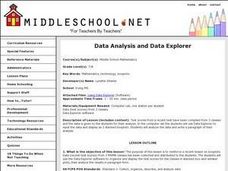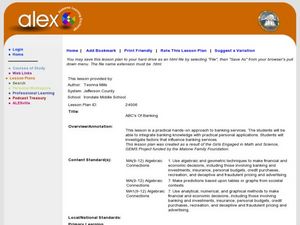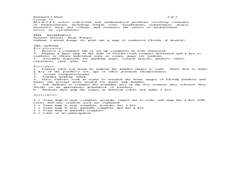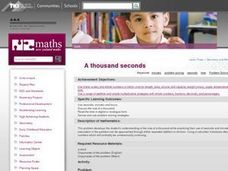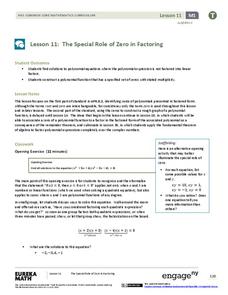Curated OER
Diagonals and Altitudes
Students discover the mathematical way to find the dimensions of a diagonal. Using this process, they complete a worksheet in which they identify the relationships between different degree triangles. They review their answers and are...
Curated OER
You Can Count on Squares!
Fourth graders engage in and explore to develop mathematical, specifically algebraic, ideas. Although the tasks are built around measurement, they are algebraic to the extent that they require 'formulae' to be derived form the geometric...
Curated OER
Data Analysis and Data Explorer
Students use the Data Explorer software to organize and display the test scores for the classes in stacked box-and-whisker plots, then analyze the results in paragraph form.
Curated OER
Sonic Booms and Logarithms
High schoolers practice working with the symbolic notation for logarithms. They understand various types of patterns and functional relationships. They use symbolic forms to represent and analyze mathematical situations.
Curated OER
Number Sense Sampler
First graders illustrate a math problem with counters while reading story books, such as Margie Burton's "Add the Animals". They demonstrate a positive learning attitude toward mathematics and communicate clearly in oral, artistic,...
Curated OER
Math: a World of Symmetry
Students expand their knowledge of quadrilaterals and identify basic symmetrical forms. Over three weeks, they explore the math, application, and discussion of symmetry. After conducting Internet research, students create symmetrical...
Curated OER
Investigating the Idea of Tan
Fifth graders use tan to solve problems involving right-angled triangles. They solve equations of the form tan(8) =a, for a between 180 degrees and 360 degrees. They state the value of tan (8) in special cases.
Curated OER
ABC's of Banking
Young scholars explore the concept of managing money. In this managing money lesson plan, students discuss how to write checks and keep an accurate check registry. Young scholars discuss the importance and uses of debit cards and deposit...
Curated OER
Investigating the Idea of Cos
Fifth graders use cos to solve problems involving right-angled triangles. They solve equations of the form cos(++) = a, for a between -180 and 360 degrees. They state the value of cos(++) in special cases and graph y = cos(++).
Curated OER
Home on the Range
Young scholars use maps and mathematics to determine the appropriate panther population in a given area. In this Florida ecology lesson, students research the area requirements of male and female panther and use a map to help calculate...
Curated OER
Wings and Othe Things
Students work in groups that are engaged in different activities at different times. They watch the video "Madagascar" and collect data pertaining to the Fish Eagle's arm spam. They work together to perform mathematical computations...
Curated OER
Surfing to the Planets on the Internet
Seventh graders explore the planets using computers and other forms of electronic technology. They research data on two planets and compare the data. Students make conclusions regarding the size of their planets. They calculate how long...
Curated OER
A thousand seconds
Pupils use seconds, minutes, and hours. They then discuss the size of a thousand. After that they read time in digital or analogue form.
Curated OER
Tessellations
Fifth graders investigate the relationship between math and art by examining patterns and polygons.They examine how polygons make up the patterns that form tessellations, and determine tessellations that occur in nature. Finally, they...
Curated OER
City Streets in One-Point Perspective
Young scholars examine the basics of drawing forms in one-point perspective, and linear perspective. They transform their drawings into city scenes using one-point perspective.
Curated OER
Estimating Altitude of Water Cloud Base
Students perform an experiment to find the dew point at ground level and then make a chart to determine where a cloud would form.
Curated OER
Physics Rewind
Eighth graders differentiate speed and velocity. In this physics lesson, 8th graders explain Newton's laws of motion. They calculate speed using a mathematical formula.
Pennsylvania Department of Education
Tangram Challenges
Learners explore geometric concepts by working with Tangram Puzzles. In this Tangram challenge lesson plan, students use problem-solving tasks that involve physical manipulatives. Learners select a picture and use all seven...
EngageNY
Equivalent Rational Expressions
Rational expressions are just fancy fractions! Pupils apply fractions concepts to rational expressions. They find equivalent expressions by simplifying rational expressions using factoring. They include limits to the domain of the...
EngageNY
Graphing Systems of Equations
Expand on learners' understanding of quadratic-linear systems. Building on the graphic understanding developed in the previous lesson, pupils learn algebraic methods of solving the systems.
EngageNY
The Special Role of Zero in Factoring
Use everything you know about quadratic equations to solve polynomial equations! Learners apply the Zero Product Property to factor and solve polynomial equations. They make a direct connection to methods they have used with quadratic...
EngageNY
Geometric Sequences and Exponential Growth and Decay
Connect geometric sequences to exponential functions. The 26th installment of a 35-part module has scholars model situations using geometric sequences. Writing recursive and explicit formulas allow scholars to solve problems in context.
EngageNY
Trigonometry and the Pythagorean Theorem
Ancient Egyptians sure knew their trigonometry! Pupils learn how the pyramid architects applied right triangle trigonometry. When comparing the Pythagorean theorem to the trigonometric ratios, they learn an important connection that...
EngageNY
Representing Reflections with Transformations
In the 16th lesson in the series of 32 the class uses the concept of complex multiplication to build a transformation in order to reflect across a given line in the complex plane. The lesson breaks the process of reflecting across a line...


